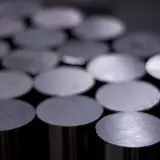2618 is an aluminium copper alloy with high strength and heat resistance, its composition also includes magnesium and iron, which contribute to its performance. Its typical use is in aerospace for pistons and rotating aircraft parts and automotive pistons due to its ability to maintain strength at elevated temperatures.
2618 has good resistance to fatigue, this means that 2618 is suited well for components subjected to cyclic stress, this characteristic is particularly valuable in high-stress applications requiring long-term reliability, such as aircraft engine parts. Engineers often select 2618 for components that must withstand prolonged stress periods due to its resilience under repeated loading.
In terms of workability, 2618 offers reasonable machinability, allowing for the production of complex shapes. Welding 2618 presents more challenges than some other aluminium alloys, it demands specific techniques and a higher level of expertise to achieve reliable joints.
While 2618 provides adequate corrosion resistance for many applications, it's not amongst the top performers in this area. If used in particularly corrosive environments, additional protective measures may be necessary to ensure longevity.
The alloy's strength-to-weight ratio is favourable, though not exceptional within the spectrum of high-performance aluminium alloys, this balance of properties makes it a practical choice for applications where both weight and strength are important considerations.
Heat treatment can significantly influence the mechanical properties of 2618, these processes are crucial to achieve optimal strength and performance characteristics.
It's worth noting that 2618 may not be the best choice for applications requiring high ductility or formability, its strength comes at the cost of some malleability, which can limit its use in certain manufacturing processes.
Related Products
Technical specification
Related Specifications
Density
Chemical Composition (WT %)
Typical Mechanical Properties

Need more information? Get in touch

